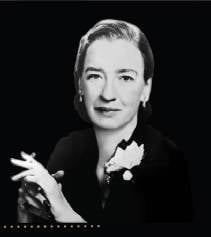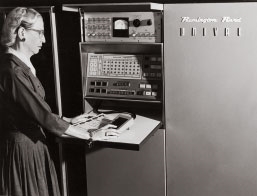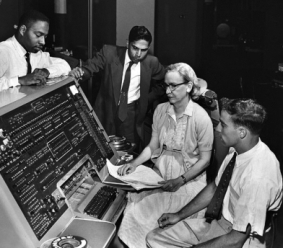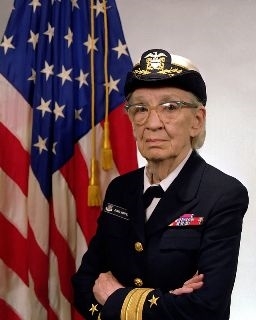 |
| Grace Murray Hopper (events.stanford.edu (Kurt Beyer)) |
Inventing the Impossible "Life is too short to keep doing the same thing over and over and over again" ("Honoring Grace Hopper") said Grace Hopper, one of the most renowned computer scientists of all time. This short quote sums up her entire life as a ground-breaking programmer in and out of the U.S. Navy. Grace Hopper was born in New York City on December 9, 1906, and died January 1, 1992. Throughout her childhood she had been strongly interested in mathematics and how machines were constructed, which her parents encouraged. She earned her PhD for mathematics at Yale university, which as a woman, was almost unheard of. In 1943, after teaching as a mathematics professor at Vassar College, Grace Hopper joined the Naval Reserve ("Honoring Grace Hopper"). She graduated first in her class of 800 officer candidates and was assigned to a computation project at Harvard University ("Honoring Grace Hopper") After starting her career in computer science, Hopper worked on the world's first large-scale computer: Harvard's Mark I. She had many achievements, most notably her development of the first computer languages written in English - rather than math - and inventing the compiler that translated a programmer's English code into machine code ("Honoring Grace Hopper"). As a programmer, Grace Hopper had two qualities that set her apart from the rest of her colleagues. One was her unparalleled determination, and another was her creative mind. Her determination to follow her own will made it so that nobody could hold her back, giving her the room to expand her thinking. Grace Hopper's strong-willed determination, along with her creative mind, allowed her to greatly advance modern-day technology, making her a hero in today's society.
 |
| Grace Hopper working (vq.vassar.edu ( Olivia Mancini)) |
Hopper's determination to follow her own values and beliefs allowed her to succeed in a field where few women had, and make the contributions she is known for today. After high school, Grace Hopper went on to become a college professor, "Despite bleak prospects for female mathematicians in teaching beyond the high school level, Vassar College hired her first as an instructor, then as a professor of mathematics" ("Grace Hopper"). Women in Grace Hopper's era seldom pursued jobs in the STEM (Science Technology Engineering Mathematics) field. The expectations for Hopper were no different; however, Hopper pursued mathematics beyond the level an average female of her day would, and did not conform to society's unspoken rules. Her determination lead her to pursue higher level math and eventually be part of the front lines of a technological revolution. As a woman in her era, Grace Hopper proved that she could succeed regardless of what others thought of her. And, because of this, she went on to pursue other dreams: "Pursuing her belief that computer programs could be written in English, Admiral Hopper moved forward with the development. When she recommended that an entire programming language be developed using English words, however, she 'was told very quickly that [she] couldn't do this because computers didn't understand English.' It was three years before her idea was finally accepted" (Grace Hopper Celebration of Women in Computing). Grace Hopper was told that her goal could never become a reality. However, she did not bend to the wills of others, and followed through with her beliefs. Her strong will paid off after three years, when her works were finally acknowledged. Grace Hopper's beliefs and dreams were not swayed by the norms of society, nor by boundaries set by her colleagues. Her determination to achieve her goals allowed her to create revolutionary devices for the field of technology and society today, making her a hero.
 |
| Grace Hopper at UNIVAC keyboard (en.wikipedia.org ("Commodore Grace M. Hopper, USN (covered)" by Jame)) |
Grace Hopper's will to go against the grain also fueled her creativity and imagination for the impossible. Without the chains of normality, Grace deliberately refused to accept the "typical" ways of thinking. When she spoke at Ohio State University, Hopper told the students, 'Humans are allergic to change. They love to say, 'We've always done it this way.' I try to fight that. That's why I have a clock on my wall that runs counterclockwise" (Shieber). Instead of conforming to society, Grace Hopper embraced change. Doing so gave her the room to think of new, different ways of doing things humans have done all their lives. Refusing to conform lead to her ability to intuitively think and create. With her mindset, she was able to "defy" the human brain and create the impossible: a compiler. "Nobody believed that," she said. "I had a running compiler and nobody would touch it. They told me computers could only do arithmetic"(Shieber).Grace continued to work on what would become the world's first-ever functional compiler, despite the unsupportive attitude from her peers. They told Hopper about the limitations of the computer, and she took those limitations and shattered them. Hopper thought of giving computers a purpose other than arithmetic, which was not thought of as possible. It seemed so impossible that, even after Hopper created a means for doing so, her peers did not believe it. As a Navy, " 'Admiral Hopper was known for her combative personality and her unorthodox approach.' Unlike many of her colleagues in the early days of computers, Hopper believed in making computers and programming languages increasingly available and accessible to non specialists"("Grace Hopper") Grace Hopper was eager to fight and work her way around tradition. Her "unorthodox" approach to things lead her to strive to make computers accessible to the general public. Her strong mind refused to bend to what others told her was possible or not, which ultimately lead to her making huge advances in technology. Grace Hopper's creative mind surprised the world more than once, as she created many things considered to be impossible to do. Her mind for the impossible helped society as a whole, as well as each individual in it, unconditionally making her a modern-day hero.
 |
| Commodore Grace M. Hopper (en.wikipedia.org (James S. Davis)) |
Because of Grace Hopper, technology advanced drastically, making the computers that society knows of today. Her mind was set differently from everyone else; her will to not only do well, but also do things differently, made her an inventor. She invented means for modern-day technology - which in her time seemed close to unthinkable - to become a reality, by being both hard-headed and 'unorthodox'. She stopped at nothing to achieve her goals, and continued on to break the belief in the words "possible" and "impossible". Being in the field of computer science and mathematics, as a woman, is an inspiring achievement itself. But as a person, Grace Hopper proved that "impossible" is a word that only limits the human's abilities. When Grace Hopper joined the Navy, " the experience was both disconcerting and instructive. Without any background in computing, she was handed a code book and asked to begin computations" ("Grace Hopper"). With no prior experience, Hopper was put in the computer science field. She was given a book and told to learn. Even though she had no traditional education on computer programming, Hopper persevered and soon became one of the field's most celebrated figures, inspiring women and programmers around the world. Without Grace Hopper, technology would not be used the way society uses it today. With the invention of the compiler, Grace Hopper literally "taught computers how to talk, allowing programmers to use words instead of numbers" (McIntyre). Computer programming itself changed from only being able to use mathematical notation, to being able to use English words. A computer's functionality changed from solely arithmetic, to civilian purposes, like typing up an essay about how computers changed. Because of her, technology is the way it is today: useful, and relevant to almost every aspect of life. Sure, Grace Hopper isn't a hero in the sense that she combated evil, or selflessly saved people in house fires. However, she did revolutionize the then machine that could only do math, to the machine that now has hundreds of purposes: the computer. She redefined the purpose of a computer, and rewrote the word "impossible". She showed how determination can bring you a long way. And because of this, she is my hero.
Works Cited Grace Hopper Celebration of Women in Computing. "Grace Murray Hopper." Computer Science. Yale University, 1994. Web. 04 May 2015. <http://cpsc.yale.edu/grace-murray-hopper> . "Grace Hopper." Notable Scientists from 1900 to the Present. Ed. Brigham Narins. Detroit: Gale, 2008.Biography in Context. Web. 28 Apr. 2015. "HONORING GRACE HOPPER." States News Service 22 Dec. 2014. Biography in Context. Web. 28 Apr. 2015. Mcintyre, Elizabeth. "Women can thrive in technology, too." Crain's Cleveland Business 3 Nov. 2014: 0010.Biography in Context. Web. 28 Apr. 2015. Shieber, Philip. "The Wit and Wisdom of Grace Hopper." OCLC Newsletter (Mar.-Apr. 1987): 9. OCLC Newsletter. OCLC, 8 Apr. 2008. Web. 4 May 2015. <http://library.oclc.org/cdm/ref/collection/p267701coll28/id/1007> .
Page created on 8/8/2015 12:00:00 AM
Last edited 8/8/2015 12:00:00 AM
